If you’re concerned about BPA coming into contact with your food, as we are, you probably look for BPA free canned goods. Here are our top picks for brands selling BPA free canned beans, pumpkin, seafood, and other goods.
Table of Contents
The US Food and Drug Administration banned the use of BPA (bisphenol A) from baby bottles and sippy cups in 2012, over concerns about hormonal disruption and other problems. Troublingly, the chemical is still present in many other items, including receipt paper, water bottles, and canned goods in the US.
What’s more, some of the alternatives to BPA are also now raising concerns. In this post, we take a look at the best BPA-free canned goods and share our research on why you should avoid BPA alternatives.
Several companies now offer canned goods that claim to be BPA-free, but these are our top picks based on when they started caring about BPA, brand transparency, and overall sustainability.
We’ve also included some super popular brands that are less than stellar when it comes to BPA and other policies, just so you’re aware when browsing store shelves.

Amy’s
Highlights: A longstanding, reputable company offering all BPA-free cans without any of the similarly troublesome BPA alternatives.
Amy’s was one of the first brands to take BPA concerns seriously. The company quickly moved away from BPA linings and now offers tin-plated cans with a non-BPA lining made of acrylic for the can body and polyester for the can lid. These linings are made in the US and are approved by the FDA for direct food contact (though, frankly, so is BPA).
While not as good as buying ‘canned’ goods in glass, Amy’s arguably offers the best BPA-free canned goods around. And I love that the company is transparent about the lining they’ve chosen and that these cans do not contain BPA alternatives such as Bisphenol S (BPS), Bisphenol F (BPF), Bisphenol A Diglycidyl Ether (BADGE), Novolac Glycidyl Ether (NOGE), Butylated Hydroxytoluene (BHT), or phthalates. The current can linings do not have synthetic estrogen as an ingredient.
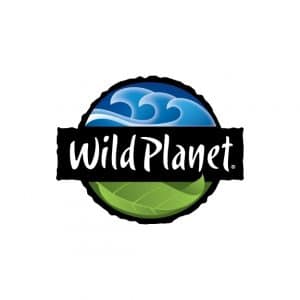
Wild Planet
Highlights: Sustainable seafood company with a robust policy against using BPA linings and with stringent third-party testing.
All of Wild Planet’s canned products are packaged without intentionally added BPA. The process of transitioning to the BPA-NI cans began in 2012, when the company received certification from its manufacturers stating that the can linings were BPA-free. They added this to the can labels and shortly thereafter sent the cans for third party testing.
The tests revealed that while there was no BPA used in the linings, BPA was present in trace amounts, meaning that Wild Planet felt uncomfortable making the claim: “BPA-free.” The company chose to switch to a statement saying, “No BPA used in can lining,” but subsequent to the passing of California Prop 65 and its provisions on BPA (which provides no “safe harbor” level for oral exposure), the company removed the statement.
Confusing as this may be, especially if you see the brand’s products beside others that still loudly proclaim ‘BPA-free’, the fact remains that Wild Planet does not use BPA in the linings of their canned goods. Instead, a Wild Planet representative told me that the company uses cans with liners made of a vinyl organosol blend and not BPA alternatives like BPS, BPA-F, or BADGE.
The company also sources its seafood sustainably, including details of harvesting practices and locations. Wild Planet is not MSC (Marine Stewardship Council) certified, but that’s because the company believes the MSC certification is not as robust as it once was and does not offer the same degree of sustainability as already practiced at the company.
Wild Planet offers most of its products in recyclable cans, but some products are packaged in plastic pouches. These are not currently recyclable but the company is currently developing a new format of recyclable, single-serving packaging. The company’s ready-to-eat tuna bowls are fully recyclable.
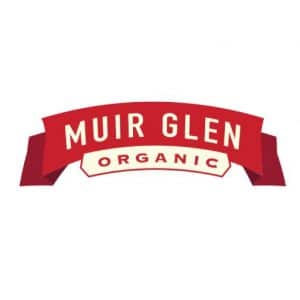
Muir Glen
Highlights: Darned good fire roasted tomatoes and other organic, non-GMO certified tomato products in cans without BPA.
Muir Glen are tomato specialists, but while other brands still cling to their BPA linings for these acidic foodstuffs, this company has gone entirely BPA-free. In addition to offering tomatoes in glass jars, Muir Glen uses food-grade/food-safe vinyl liners in the cans, meaning the coating is inert and no leaching or corrosion occurs.
Muir Glen also exclusively uses Certified Non-GMO, USDA Organic tomatoes grown and canned in California. These tomatoes are field-grown and vine-ripened and, I have to say, absolutely delicious! Thei company’s fire-roasted tomatoes are excellent!
In addition to their organic commitment, Muir Glen has partnered with the Xerces Society to plant pollinator habitats on the California farms that grow the company’s tomatoes. Muir Glen also strives for long-term partnerships with farmers, encouraging better working conditions, practices, and financial sustainability.
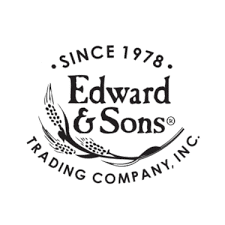
Edward & Sons
Highlights: Well respected company with a history of fair trade and sustainable practices, offering canned goods without BPA linings and with stringent third-party testing.
Edward & Sons requests that the company’s products are packed using cans without detectable levels of BPA and offers a second level of assurance by performing independent tests of these BPA-free cans. The company has been doing this since 2011, with a licensed, domestic third-party laboratory testing for BPA using a High-Performance Liquid Chromatography (HPLC) method.
The company recognizes that BPA is present in the environment and that this means it may be disingenuous to claim that a product is BPA-free, even if no BPA is intentionally used in the cans. As such, the company doesn’t outright claim that cans are BPA-free. I reached out to ask the company for more information and a spokesperson confirmed that “all our canned products are deemed non-intent in the case of bisphenol compounds,” including BPS, BPAF, or BADGE. Furthermore, “Depending on the type of food being canned a polyester or epoxy resin will be used to the line the tin can.”
On the whole, Edward & Sons is a longstanding reputable company with some pretty sustainable practices. These include embracing fair trade, plant-based diets, and integrated pest management while promoting organic certification at their partner farms worldwide.
Some Edward & Sons brand names to keep an eye out for include: Edward & Sons, Native Forest, Let’s Do Organic, Let’s Do Gluten Free, The Wizard’s, Premier Japan, More Than Fair, Road’s End Organics, Nature Factor, and Ecuadora.
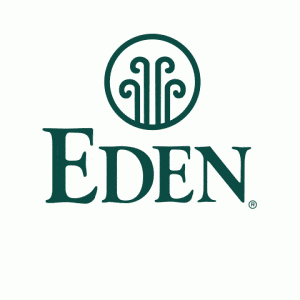
Eden Foods
Highlights: A progressive leader in eliminating BPA from canned goods, if not in other matters.
Eden Foods was another early adapter following concerning reports about BPA in the 1990s. Though I’m not a fan of the company’s politics on reproductive rights, it is impressive that from 1997 onwards, Eden Foods has been working to replace all BPA-lined cans with safer alternatives. This involved significant and arduous negotiation with packaging manufacturers unwilling to divulge proprietary information about their use of BPA or to switch away from it.
Eventually, however, Eden Foods’ persistence paid off and one manufacturer noted that prior to BPA, cans were lined with a vegetable resin enamel. So, despite the dramatically higher cost of such a process, in 1999, the company switched its bean products to a custom-made can lined with a 1960’s vintage oleoresin c-enamel that did not contain BPA. Oleoresin is a mixture of oil and plant resin extracted from pine or balsam fir trees.
In 2017, the company switched all products to cans with a lining safe for both low acid and high acid foods, meaning that even tomato-based products are now in non-BPA cans. Eden Foods also started to label its canned beans, rice and beans, refried beans, chili, and tomatoes as BPA, BPS, and phthalate-free. Unfortunately, the company doesn’t state what this lining is made from, so I reached out to ask and am awaiting a response.
Nowadays, Eden Foods offers products in these much-improved cans and continues to offer some products packed in Tetrapaks and glass jars. The lids for the jars do have a coating made with BPA, but this is covered with a second coating without BPA that creates an effective barrier between the BPA and contact with food.
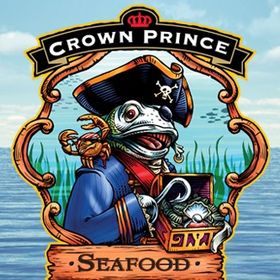
Crown Prince Seafood
Highlights: Eco-minded seafood company with a robust Corporate Social Responsibility program and impressive carbon footprint reduction, offering sustainably caught fish products in cans made without intentionally added BPA.
Crown Prince specializes in seafood, offering canned tuna, salmon, sardines, and other goods. The company used to have a list of BPA-free cans on their website but with Prop 65’s zero-tolerance for BPA going into effect, the company removed this and now simply states that “Some product packaging distributed by Crown Prince may have traces of BPA, although most of our products are packaged in cans that no longer use BPA in the can lining.” I’ve written to the company to ask for an updated list and more information on their current can linings.
Crown Prince has been highly engaged in sustainability efforts for more than a decade. It established a Green Team back in 2010 to “identify and implement specific projects and goals to help the company manage and reduce its environmental impact.” This included tracking and managing greenhouse gas emissions, waste, and recycling. After establishing baseline emissions in 2012, the company set a public target to reduce emissions from market-based electricity usage by 75% through 2020. In 2019, Crown Prince met that goal early, achieving a 78.7% reduction.
Crown Prince also measures Scope 3 emissions, going beyond typical tracking to include business travel, employee commuting, shipping and more. The company also purchases verified offsets to further reduce its environmental impact.
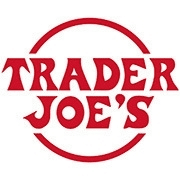
Trader Joe’s
Highlights: Wide range of goods packaged without BPA, with a comprehensive list regularly updated on the Trader Joe’s website.
Trader Joe’s offers a decent level of transparency on their non-BPA canned goods and bottles. Naturally, it would be great if the company had a blanket policy where no products were packaged with BPA, but this is a good start.
The non-BPA packages, as currently stated on the Trader Joe’s website, are:
- ALL Tetra-Pak® Cartons
- ALL Plastic Bottles, Tubs & Containers
- ALL Canned Coconut Milk & Coconut Cream
- ALL Pet Food
- ALL Canned Beans, Fruits & Vegetables
- MOST Canned Fish & Chicken
- Organic Vegetarian Chili
- Canned Dolmas – Regular & Quinoa
- Canned Grecian Style Eggplant with Tomatoes & Onions
- Canned Giant Baked Beans in Tomato Sauce
- Canned Greek Chickpeas with Parsley & Cumin.
The ones to avoid, i.e., packages with BPA, are the Trader Joe’s Canned Soups & Stews (EXCEPT: Organic Vegetarian Chili).
The company also notes that while the metal lids of glass jars contain BPA, this doesn’t come into contact with food as there is an extra layer on top of that coating that means no BPA leaches from the lids.
I’ve asked Trader Joe’s for more information on the BPA alternatives used in the company’s linings and will update here if/when I get a response.
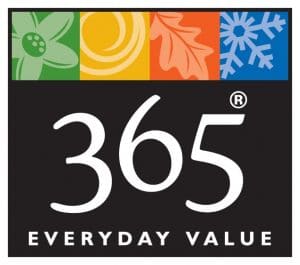
Whole Foods 365 Everyday Value®
Highlights: Wholefoods is not at all transparent about which products are canned or packaged with BPA, though the company does say it is transitioning all products to FDA approved lining alternatives.
Whole Foods is, obviously, a super popular place to shop but the company, rather surprisingly, has a rather weak policy on BPA. In fact, there’s not really a policy at all. Instead, I got a statement from Whole Foods saying:
“The FDA-approved alternatives to BPA-epoxy lining include vinyl, acrylic, polyester, and oleoresin. Most of our 365 Everyday Value® brand products that previously may have had BPA-epoxy lining have been transitioned to packaging that contains these FDA-approved alternatives, and we are continuing to work towards transitioning the remainder. We also offer many products in inherently BPA-free types of packaging, such as aseptic cartons and glass jars.”
So, if you’re buying the 365 brand at Whole Foods, be aware that there may well be BPA in the linings. Look for those aforementioned products that are inherently BPA-free while shopping the 365 brand at Whole Foods.
Thank you so much for listening some of the good companies but how about listing some of the very bad companies the worst offenders thank you
Hi Michael,
Thanks for the comment. Our general approach is to try to highlight the best companies making the best products, rather than putting out negative reviews. The exception is where a company we previously held in high regard significantly changes the design of its products or where we think it best to mention why we’ve removed a product or company from our recommendations.
For negative reviews, there’s definitely plenty already out there on the internet!
Leigh
This is all very helpful information about the safety of canned foods, so thank you. However, I’d also really like to know what kind of POTS companies use to cook what they put into their BPA free cans! If they are using aluminum pots, I don’t want to buy their products!!
Very thoughtful comment, Cynthia! We will have to look into that issue in a future post.